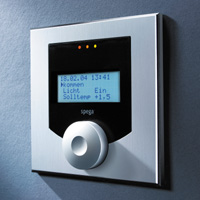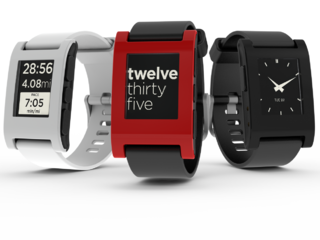
Home automation or domotics is building automation for a home. A home automation system will monitor and/or control home attributes such as lighting, climate, entertainment systems, and appliances. It may also include home security such as access control and alarm systems.
Control4 is a brand of automation and networking systems for homes and businesses, offering a customizable and unified smart home system to automate and control connected devices including lighting, audio, video, climate control, intercom, and security. The Control4 platform interoperates with more than 13,000 third-party products and it is available in over 100 countries. After merging with SnapAV, by 2024 Control4 managed over half a million homes through a network of 12,000 authorized dealers. The company was based in Draper, Utah from 2003, until its relocation to Lehi, Utah in 2023. Control4 currently operates as a brand/division of ADI Global Distribution.

A smart TV, also known as a connected TV (CTV), is a traditional television set with integrated Internet and interactive Web 2.0 features that allow users to stream music and videos, browse the internet, and view photos. Smart TVs are a technological convergence of computers, televisions, and digital media players. Besides the traditional functions of television sets provided through traditional broadcasting media, these devices can provide access to over-the-top media services such as streaming television and internet radio, along with home networking access.
Joyent Inc. is a software and services company based in San Francisco, California. Specializing in cloud computing, it markets infrastructure-as-a-service. On June 15, 2016, the company was acquired by Samsung Electronics.

A smartwatch is a portable wearable computer that resembles a wristwatch. Most modern smartwatches are operated via a touchscreen, and rely on mobile apps that run on a connected device in order to provide core functions.

Pebble is a discontinued smartwatch developed by Pebble Technology Corporation based in Palo Alto, California that shipped from 2013 to 2016. A brainchild of Eric Migicovsky, funding was conducted through a Kickstarter campaign in 2012. It was the most funded project in Kickstarter history at the time, raising $10.3 million. Pebble watches can be connected to Android and iOS devices to show notifications and messages. An online app store distributed Pebble-compatible apps from many developers including ESPN, Uber, Runkeeper, and GoPro.

The Ouya, stylized as OUYA, is an Android-based microconsole developed by Ouya Inc. Julie Uhrman founded the project in 2012, bringing in designer Yves Béhar to collaborate on its design and Muffi Ghadiali as VP of Product Management to put together the engineering team. Development was funded via Kickstarter, raising US$8.5 million, becoming one of the website's highest-earning projects in its history.
IFTTT is a private commercial company that runs services that allow a user to program a response to events in the world.

The Samsung Galaxy S5 is an Android-based smartphone unveiled, produced, released and marketed by Samsung Electronics as part of the Samsung Galaxy S series. Unveiled on 24 February 2014 at Mobile World Congress in Barcelona, Spain, it was released on 11 April 2014 in 150 countries as the immediate successor to the Galaxy S4. As with the S4, the S5 is an evolution of the prior year's model, placing a particular emphasis on an improved build with a textured rear cover, IP67 certification for dust and water resistance, a more refined user experience, new security features such as a fingerprint reader and private mode, expanded health-related features including a built-in heart rate monitor, a USB 3.0 port, and an updated camera featuring speedy auto-focus through phase-detection. The video resolution has been upgraded to 2160p (4K) and the frame rate at 1080p has been doubled to 60 for a smooth appearance.

Reality Labs, formerly Oculus VR, is a business and research unit of Meta Platforms that produces virtual reality (VR) and augmented reality (AR) hardware and software, including virtual reality headsets such as the Quest, and online platforms such as Horizon Worlds. In June 2022, several artificial intelligence (AI) initiatives that were previously a part of Meta AI were transitioned to Reality Labs. This also includes Meta's fundamental AI Research laboratory FAIR which is now part of the Reality Labs - Research (RLR) division.
Solaborate/ˈsōˈlabəˌrāte/ is a communication and collaboration platform for professionals and consumers. It allows them to do video calls, share documents, screencast and screen share, remotely monitor their home or office. Solaborate is a combination of the words "social" and "collaboration". Solaborate has both software and hardware in the form of the HELLO Messenger and HELLO Communication Device.
The Air Quality Egg (AQE) is an Internet of Things platform and hobbyist device for crowdsourced citizen monitoring of airborne pollutants. The device won widespread recognition when it was named one of the best projects on Kickstarter in 2012, and has been featured in a variety of media outlets. Data from each device is uploaded to Xively and published on the Air Quality Egg website. The device can be used with 3rd-party mobile apps such as Acculation's AQCalc.
Space Monkey was a cloud storage company founded by Clint Gordon-Carroll and Alen Peacock in Utah in 2011.

littleBits is a New York City-based startup that makes an open source library of modular electronics, which snap together with small magnets for prototyping and learning. The company's goal is to democratize hardware the way software and printing have been democratized. The littleBits mission is to "put the power of electronics in the hands of everyone, and to break down complex technologies so that anyone can build, prototype, and invent." littleBits units are available in more than 70 countries and used in more than 2,000 schools. The company was named to CNN's 10 Startups to Watch for 2013.
Mycroft was a free and open-source software virtual assistant that uses a natural language user interface. Its code was formerly copyleft, but is now under a permissive license. It was named after a fictional computer from the 1966 science fiction novel The Moon Is a Harsh Mistress.

Google Assistant is a virtual assistant also artificial intelligence software application developed by Google that is primarily available on home automation and mobile devices. Based on artificial intelligence, Google Assistant can engage in two-way conversations, unlike the company's previous virtual assistant, Google Now.

Wink is an American brand of software and hardware products that connects with and controls smart home devices from a consolidated user interface. Wink, Labs Inc., which develops and markets Wink, was founded in 2014 as a spin-off from invention incubator Quirky. After Quirky went through bankruptcy proceedings, it sold Wink to Flex in 2015. As of 2016, the Wink software is connected to 1.3 million devices. In July 2017, Flex sold Wink to i.am+ for $59 million.

Home Assistant is free and open-source software used for home automation. It serves as an integration platform and smart home hub, allowing users to control smart home devices. The software emphasizes local control and privacy and is designed to be independent of any specific Internet of Things (IoT) ecosystem. Its interface can be accessed through a web-based user interface, by using companion apps for Android and iOS, or by voice commands via a supported virtual assistant, such as Google Assistant, Amazon Alexa, Apple Siri, and Home Assistant's own "Assist" using natural language.
Smartcar, Inc. is a software company based in Mountain View, California. It allows software developers to locate, unlock, and read data from vehicles using an API.
Homey is a smart home hub manufactured by the Dutch company Athom B.V.










